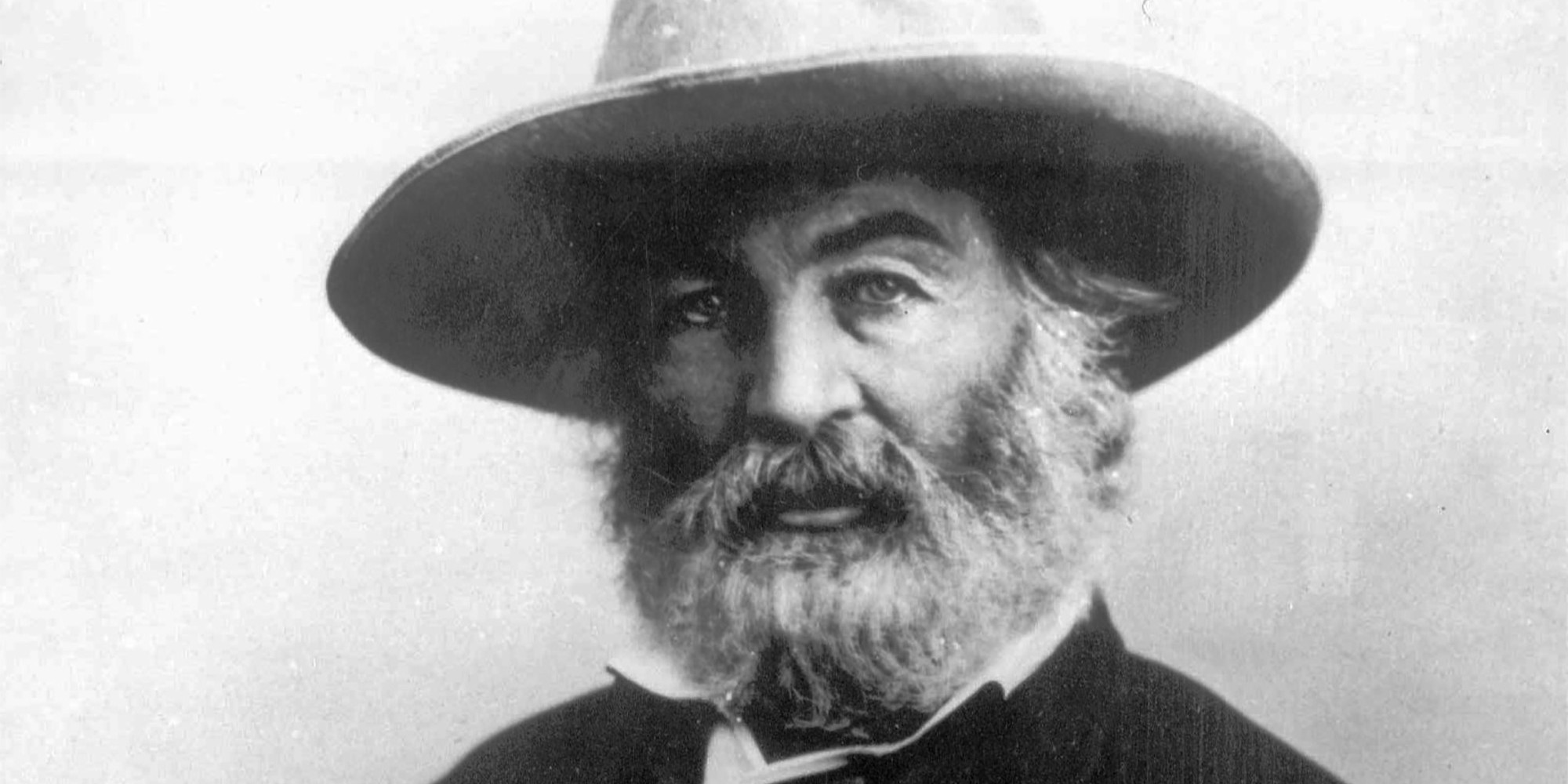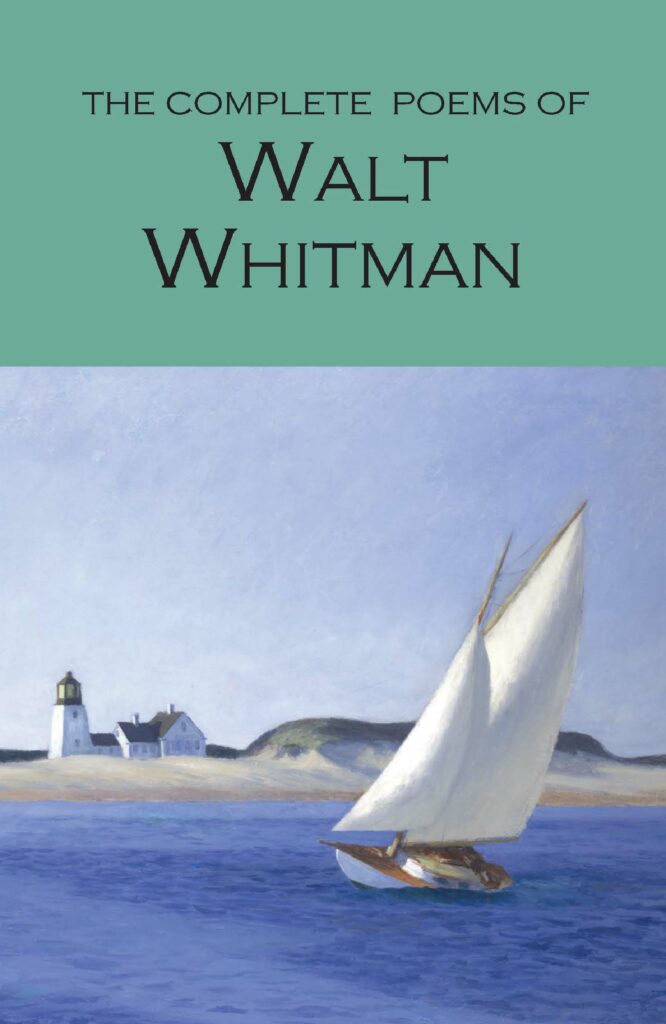
Sally Minogue looks at Walt Whitman
On National Poetry Day, Sally Minogue looks at Presidents, Poetry, and Walt Whitman.
Ah, dear father, graybeard, lonely old courage-teacher, what America did you have when Charon quit poling his ferry and you got out on a smoking bank and stood watching the boat disappear on the black waters of Lethe? –A Supermarket in California
Thus Allen Ginsberg, in Berkeley, California in 1955, addressed his great mentor and fellow American, Walt Whitman – one poet speaking to another, one American asking guidance from another. The date is significant: Whitman’s first edition of Leaves of Grass had been published a hundred years earlier, in 1855. For Ginsberg, in 1955, the social, political and sexual revolutions that were to hit Berkeley and Europe were still over a decade away. ‘A Supermarket in California’, his paean to Whitman, was one of the ‘other poems’ in Howl and Other Poems. His ‘Howl’ was a deliberate echo of Whitman’s ‘barbaric yawp’(69), and in ‘Supermarket’ one can hear the slight note of bewilderment – how had Whitman done, a whole century earlier, what he, Ginsberg, was struggling to do in the middle of the twentieth century?
In 1855 Whitman was able to say with all seriousness (in his Preface to Leaves of Grass): ‘Of all nations the United States with veins full of poetical stuff most need poets … Their Presidents shall not be their common referee so much as their poets shall.’ He also talked in that Preface about ‘the terrible significance of [the common people’s] elections – the President’s taking off his hat to them not they to him –’. Hmmm. Whitman’s work reminds us that the idea of a United States is, as he writes, still a recent idea, and one threatened by the ideological disagreement over slavery, which would erupt finally in the Civil War. His book-length poem gradually added from 1855 until the death-bed edition of 1892, reflects the ebb and flow of the making of America, with Abraham Lincoln figuring as its hero in the section ‘Memories of President Lincoln’, including two supreme poems, ‘O Captain! My Captain’, made known to many in the film Dead Poets’ Society, and ‘When Lilacs Last in the Dooryard Bloom’d’. The President when Ginsberg published Howl and Other Poems was Dwight D. Eisenhower, elected in the surge of his post-war reputation. His Vice-President? Richard Nixon. Neither of them was a man to inspire a poem – other than one hostile to the American tendencies they represented. Howl is that angry poem? Ginsberg said later, ‘In publishing “Howl”, I was curious to leave behind after my generation an emotional time bomb that would continue exploding in U.S. consciousness in case our military-industrial-nationalist complex solidified into a repressive police bureaucracy.’
Whitman’s adulatory poems to Lincoln grew, of course, out of a special set of circumstances. President John F. Kennedy, another victim of the American habit of presidential assassination, is the only recent President whose death one can imagine inspiring a major American poem. Examples of poems written about his death, some by considerable poets, can be found at the University of Delaware, but none of them matches the sense of personal grief, or the poetic mastery, to be found in Whitman’s response to Lincoln’s death. Kennedy, it was who initiated the tradition of a poet reading at the President’s inauguration (1961). Famously, the venerable 86-year-old Robert Frost was unable to read his specially written poem – supposedly the sun shone too brightly on the snow, or the typewritten ink was too faint, or the wind blew the paper about, but the youtube video shows him fumbling and hesitating with his text. And so instead he recited from memory his poem from 20 years earlier: ‘The Gift Outright’. The ‘we’ in the first line – ‘The land was ours before we were the land’s’ – sets settler Americans against the imperial power of England. By 1961, when the poem was recited at such a symbolically powerful event as the Presidential inauguration, the exclusive power of that ‘ours’ was more noticeable. Black Americans and Native Americans knew they were not included. See the moment when Frost fails to read his specially written poem ‘Dedication’, and The Poetry Foundation for the text of ‘The Gift Outright, and The Library of Congress for a brief history of poems featured at Presidential inaugurals.
Kennedy, for all his faults, seems to have been serious about poetry; in 1963, receiving an honorary degree at Amherst College, he paid tribute to Frost who had died earlier that year and also paid tribute to poetry’s role in opposing the institutions of power: ‘When power leads man towards arrogance, poetry reminds him of his limitations. When power narrows the areas of man’s concern, poetry reminds him of the richness and diversity of his existence. When power corrupts, poetry cleanses.’ See The Marginalian for a complete recording of Kennedy’s speech, and for his handwritten corrections to the original typescript.] Kennedy died only a few months later, in the same year as his poetic hero, and over 40 years his junior. Frost and Kennedy may have fallen short in terms of what they thought of as their American inclusivity; Whitman could have taught them a lesson there. Nonetheless, Kennedy’s Amherst speech, which is redolent with a belief in the singular power and necessary freedom of the artist, and of the importance of art and culture in the formation of a nation, is a sad reminder of the pusillanimous spirit of the current Administration. Donald Trump felt no need for poetry at his inauguration.
So what of Whitman in all of this? Well, he’d certainly have agreed with Kennedy about the role of poetry in reminding man of ‘the richness and diversity of his existence’. But he was ahead of Kennedy in recognizing the equal role of women, and in using the indigenous language of the Native Americans. Whitman wrote in a fortunate moment when he felt that poetry had a clear role in giving voice to the moral and political impulse of a whole nation. Part of his doing so, paradoxically, was that at that moment the nation was even more divided than it is today. His inclusive vision was intended precisely to unite and inspire, and lead America in the direction of generosity and equality; moreover, the democracy he espoused went way beyond the bounds of America and reached out to Europe – where it had anyway originated. When he gives vent to this full-bloodedly, as he does most notably in the wonderful ‘Song of Myself’, there is no doubting him. As his disciple Ginsberg says, paraphrasing another great American poet, William Carlos Williams, ‘It is in the poem, as WCW says, that we reconstruct the world lost’. From the world lost, Whitman constructs the new world (and the New World) found.
It is tempting to take Whitman entirely at his expansive word; but Ginsberg recognises that alongside the all-embracing ‘dear father’ is ‘Walt Whitman, childless, lonely old grubber, poking among the meats in the refrigerator and eyeing the grocery boys’. Stephen Matterson points out in his Introduction to the Wordsworth edition, ‘a sense of personal doubt and failure is never far beneath the surface of any Whitman poem’. (xx) This may arise in part from the tension between his sexuality and the social and especially the masculine conventions of his time, or it may reflect the weight of experience which defines a poem written over a long span of years. It is this undertow of uncertainty above all that makes his poetry great – he can utter the barbaric yawp whilst at the same time being deeply uncertain of it. For the poet who is ‘large’ and contains ‘multitudes’ (69), there’s no distinction between the mortal and the venial. Yet the sadnesses and self-questionings exert their pull from the deeps of the poem: ‘Here the frailest leaves of me and yet my strongest lasting’ (100). The wayward, shifting, portmanteau structure of the text allows him to reflect on his changing milieu, allows the passage of time and history, and allows many individual poems and voicings within the larger structure of what remains the single, large, compendious, moving and extraordinary poem – Leaves of Grass.
All Whitman quotations are from the Wordsworth edition, The Complete Poems of Walt Whitman, 2006. The Walt Whitman Archive gives access to a remarkable range of texts, documents, letters, manuscripts and images relating to the poet and his work.
Allan Ginsberg, Collected Poems 1947-1980. Harper Collins Publishers. Copyright © 1984 by Allen Ginsberg.
The Poem That Changed America: “Howl” Fifty Years Later. Ed. Jason Shindler, Farrar, Straus and Giroux, New York, 2006.
Books associated with this article
